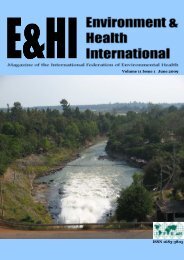IFEH ISSUE 6 - International Federation of Environmental Health
IFEH ISSUE 6 - International Federation of Environmental Health
IFEH ISSUE 6 - International Federation of Environmental Health
- No tags were found...
Create successful ePaper yourself
Turn your PDF publications into a flip-book with our unique Google optimized e-Paper software.
importance <strong>of</strong> liaising with other allied health-care pr<strong>of</strong>essionals and pr<strong>of</strong>essional bodies within and<br />
outside the country, skills to solve environmental health-related problems and participate in<br />
environmental health research projects to provide the evidence base for future environmental health<br />
related policies and practices. This has enabled EHOs working government and non-governmental<br />
organisations (NGOs) to become actively involved in the planning, implementation, monitoring and<br />
evaluation <strong>of</strong> health-related activities. In turn, the pr<strong>of</strong>ession has gained respect from other allied<br />
health-care practitioners working in the country.<br />
THE PRESENT<br />
The establishment <strong>of</strong> the degree programme at UNIMA and diploma programme at MCHS has led to<br />
better qualified cadre <strong>of</strong> graduates moving into the <strong>Environmental</strong> <strong>Health</strong> pr<strong>of</strong>ession. The majority <strong>of</strong><br />
degree graduates usually obtain positions with the Ministry <strong>of</strong> <strong>Health</strong> as EHOs (without any postgraduate<br />
practical training) and are seconded to one <strong>of</strong> the 28 Districts in the country. Here they are<br />
employed as District EHOs, Disease Control Officers, Water and <strong>Environmental</strong> Sanitation Desk<br />
Officers, Food Safety and Hygiene Desk Officers and District <strong>Health</strong> Education Officers. However,<br />
the Government <strong>of</strong> Malawi has also provided funding for practising AEHOs with the DPH to upgrade<br />
their qualification to degree level through the introduction <strong>of</strong> the parallel programme at UNIMA.<br />
Other graduates have taken up environmental health–related positions with Non-Government<br />
Organisations such as WATERAID, Save the Children, UNICEF, WHO, etc. With the introduction <strong>of</strong><br />
occupational health and safety module into the degree course graduates are now finding positions with<br />
the Ministry <strong>of</strong> Labour, G4S, and Roads Safety Council. AEHOs are mostly involved in hand on<br />
provision <strong>of</strong> <strong>Environmental</strong> <strong>Health</strong> services but designated to operate at health centre level and as<br />
supervisors <strong>of</strong> HSAs. HSAs are designated to operate at community/village level.<br />
UNIMA in conjunction with the Africa Academy for <strong>Environmental</strong> <strong>Health</strong> (AAEH) have also made a<br />
concerted effort to attract more female students onto the EH degree course. This is particularly<br />
relevant in a setting such as Malawi where the majority <strong>of</strong> the EH risks are faced by women and<br />
children. Plans are underway in the Department <strong>of</strong> EH at UNIMA to attract a greater proportion <strong>of</strong><br />
female students through career guidance and role modelling programs in secondary schools.<br />
Secondary school students have limited understanding <strong>of</strong> EH as a career option. As such, talks on EH<br />
as career options are being presented in various secondary schools in Malawi. Influential females<br />
working in the field <strong>of</strong> <strong>Environmental</strong> <strong>Health</strong> within the Ministry <strong>of</strong> <strong>Health</strong>, Institutions <strong>of</strong> Higher<br />
Learning and NGOs etc. are used as role models. These role models spend time with girls sharing their<br />
experiences to develop emotional ties which will hopefully encourage young girls to think about<br />
studying EH as a career option. This initiative has been endorsed by the Africa Women <strong>Environmental</strong><br />
<strong>Health</strong> Network (AWEHN) (July, 2011).<br />
Ironically whilst these developments in environmental health education were taking place PHIAM was<br />
slowly dying a death as a pr<strong>of</strong>essional body due to inactivity, lack <strong>of</strong> finances and had barely a pulse<br />
by the turn <strong>of</strong> the century. As result <strong>of</strong> a Commonwealth Pr<strong>of</strong>essional Scholarship (CPS) awarded to<br />
Mr. Paul Chunga, Chikwawa District EHO (at the time) he visited REHIS in 2003 to learn about the<br />
management and operation <strong>of</strong> a pr<strong>of</strong>essional EH organisation. Mr. Chunga is presently District EHO<br />
(DEHO) for Ntcheu and holds the position <strong>of</strong> Treasurer with MEHA. Upon his return to Malawi, and<br />
after due consultation with the membership, it was recommended that PHIAM should be renamed the<br />
Malawi <strong>Environmental</strong> <strong>Health</strong> Association (MEHA) in 2004. A few years later Mr. Young<br />
Samanyika, DEHO for Blantyre (at the time) visited REHIS in 2008 on a REHIS travelling<br />
18



